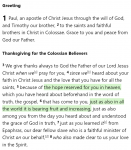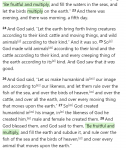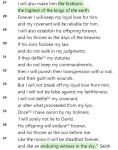Mark 13: 32 But about that day or hour no one knows, neither the angels in heaven, nor the Son, but only the Father. Jesus is confessing that there is something that He doesn't know.
The same account is also recorded in Matt. 24:36, yet, notice what is said in Matt. 11:27:
“All things have been handed over to Me by My Father; and no one knows the Son except the Father; nor does anyone know the Father except the Son, and anyone to whom the Son wills to reveal Him.” (Matthew 11:27)
Jesus says, no one knows the Son except the Father. And no one knows the Father except the Son. Jesus’ knowledge of the Father is reciprocal. The same way the Father knows the Son, the Son knows the Father. And no one is qualified, or can know Jesus except the Father. Who does Jesus think He is? No one is able to know the Son; only the Father has that ability and capacity. Only someone who is incomprehensible by nature, is beyond the ability of another to know, which is why only God can know, because the Father has a divine mind and can comprehend the incomprehensible. The Father knows the Son inside and out — knowing every thought and tittle He’s had, have, and will have — and Jesus says He knows the Father in that exact same way, which is why He alone is qualified to make the Father known. Not only does Jesus claim to have an omniscient mind (which is required to know the Father truly as He is), but that He is also incomprehensible (for only the Father can know the Son). Even long before Jesus speaks the words in Matthew 24:36, Jesus claims to be the incomprehensible, omniscient Son, who knows the Father to the same degree and extent that the Father knows the Son, and therefore, is equal to the Father in understanding, wisdom, and knowledge.
And not only that, but pay particular attention to the language found on Jesus’ lips in Matthew 21:1–3:
“As they approached Jerusalem and came to Bethphage on the Mount of Olives, Jesus sent two disciples, saying to them, ‘Go to the village ahead of you, and at once you will find a donkey tied there, with her colt by her. Untie them and bring them to me. If anyone says anything to you, say that the Lord needs them, and he will send them right away.’” (Matthew 21:1–3)
Jesus knows (without physically being present) what awaits ahead of His two disciples: A donkey and her colt. Jesus instructs His disciples to bring the donkey and colt back to Him, and should anyone stop to question them, tell them that, “the Lord needs them, and he will immediately send them.” Undoubtedly, Jesus is referring to none other than Himself as this “Lord.” But unless the words — “the Lord needs them” — fell only on the ears of Jesus’ disciples (which, according to v. 10 is not the case), then who would the ordinary Jewish commoner naturally think of had they heard these words, “the Lord needs them”? The ordinary Jewish commoner did not acknowledge Jesus “Lord.” Thus, this seems to suggest that Jesus is perhaps supplimenting a term for the Divine Name.
But just to make sure we’re understanding the import of Jesus’ words correctly, notice then what He says just a few verses later (Matthew 21:15–16):
“But when the chief priests and the scribes saw the wonderful things that he did, and the children crying out in the temple, ‘Hosanna to the Son of David!’ they were indignant, and they said to him, ‘Do you hear what these are saying?’ And Jesus said to them, ‘Yes; have you never read, Out of the mouth of infants and nursing babies you have prepared praise?’” (Matthew 21:15-16)
To what exactly was Jesus referring to when He asked, “have you never read, Out of the mouth of infants and nursing babies you have prepared praise?”
“O Yahweh, our Lord, how majestic is your name in all the earth! You have set your glory above the heavens. Out of the mouth of babes and infants, you have established strength because of your foes, to still the enemy and the avenger.” (Psalm 8:1-2)
As the context shows, the Psalter is speaking of Yahweh receiving praise from babes and infants to shame His enemies who refuse to do likewise. And yet, Jesus used this same passage to justify the praise and honor He was receiving from the children in order to silence His accusers.
But since we’re on the topic of the Second Coming, there is another gem that people overlook, which is an OT parallel to the Second Coming: Zechariah 14:1–7
“Behold, a day is coming for the Lord when the spoil taken from you will be divided among you. For I will gather all the nations against Jerusalem to battle, and the city will be captured, the houses plundered, the women ravished and half of the city exiled, but the rest of the people will not be cut off from the city. Then the Lord will go forth and fight against those nations, as when He fights on a day of battle. In that day His feet will stand on the Mount of Olives, which is in front of Jerusalem on the East; and the Mount of Olives will be split in its middle from East to West by a very large valley, so that half of the mountain will move toward the North and the other half toward the South. You will flee by the valley of My mountains, for the valley of the mountains will reach to Azel; yes, you will flee just as you fled before the earthquake in the days of Uzziah king of Judah. Then the Lord, my God, will come, and all the holy ones with Him! In that day there will be no light; the luminaries will dwindle. For it will be A UNIQUE DAY WHICH IS KNOWN TO THE LORD, neither day nor night, but it will come about that at evening time there will be light.” (Zechariah 14:1-7)
In this text the day of the Lord is referenced (the second coming of Christ). We are told YHWH will stand on the Mount of Olives and split it upon His advent (v. 4), and that this Lord’s day is known to Him (v. 7). However, Acts 1:11-12 proves that it is Jesus who will come on the Lord’s Day and stand on the Mount of Olives:
“They also said, ‘Men of Galilee, why do you stand looking into the sky? This Jesus, who has been taken up from you into heaven, will come in just the same way as you have watched Him go into heaven.’ Then they returned to Jerusalem from the mount called Olivet, which is near Jerusalem, a Sabbath day’s journey away” (Acts 1:11-12).
Since Jesus is “the Lord” mentioned in Zechariah 14:4 who stands on the Mount of Olives on the Lord’s Day as Acts 1:11-12 establishes, He is by implication likewise the LORD who knows the unique day in v. 7. Thus, it can be argued that Christ does know the day of His return in His full divine consciousness, contra the false understanding of those who misuse Matthew 24:36.
1













